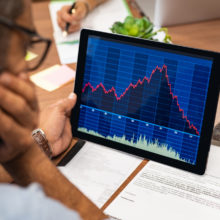Should You Proceed With IPO Planning Regardless of Market Conditions?
In January, we made three predictions about the IPO market in 2020 — but no one could have predicted the current market conditions and business ramifications as a result of the coronavirus pandemic. Companies across the globe have had to change the way they do business, from transitioning to a remote workforce to making changes to their supply chain.
But what about companies that were planning for an IPO in the near future? Should you continue with IPO planning, regardless of market conditions? Our experts weigh in below.
Sameer Khambadkone and Marisa Frackman
Managing Directors, Westwicke’s Capital Markets Advisory team
Whether an IPO this year could be achievable, or is advisable, is highly company-specific. At a high-level, it would be prudent for companies that are targeting IPOs over the next 12 months to begin preparing. However, it is also clear that a number of companies are grappling with the impact of COVID-19 and the concomitant quarantines on their revenues (for commercial-stage companies) and delays in clinical trial timelines (for clinical stage companies). Hence, we believe that companies should focus on their specific needs for capital and which markets can best meet those needs — whether the IPO market or from alternate sources.
The public markets may be available to healthcare businesses that are insulated from the effects of social distancing, as was the case with the recent IPOs of Zentalis and Keros Therapeutics in the biotech space. We expect that biotech companies in similar situations — with well-known management teams, disruptive technology platforms, clinical and regulatory timelines that are achievable in a social-distancing climate, backing from impressive public market investors, and (perhaps most importantly) covered order books at launch — will continue to selectively access the IPO market to fund clinical development.
Within MedTech and Healthcare Technology/Services, we expect investor appetite to strongly bias the highest quality, “must own” opportunities. In this environment, prospective issuers with fundamentals such as the below will be best-positioned:
- Meaningful existing revenue base
- Compelling historical growth profile, both by the company and in comparison to its peer group
- Predictable business model and ability to articulate drivers of future performance to the Street
- Line of sight to profitability (if not currently profitable)
- Highly respected management team
For management teams and boards, valuation will be a crucial consideration. IPO discounts will be wider than in 2019, and investors will have considerable pricing leverage. Many companies will need to see a rebound in multiples before making the decision to launch an IPO. That said, as we have seen in prior recoveries, the broader market backdrop, volatility levels and overall investor sentiment can shift quickly. For companies who need capital from the public markets, who can be flexible on valuation, and who have fundamentals that investors will find compelling, we think it is prudent to be prepared.
Tom McDonald
Partner
Even in these uncertain times, we see many companies using this moment to continue to prepare for their IPO process. No matter the backdrop, we usually find ourselves always short on one precious commodity: time. While many of us are safely hunkered down and working remotely, we are not fighting commuting through rush hours, running for airplanes, or sleeping in hotels. Leverage this moment and allow perhaps a bit more time to better prepare for an IPO at some point in the future when things return to normal — and we find ourselves back in a middle seat on Southwest Airlines.
Robert Uhl
Managing Director
My response is an emphatic yes. The IPO prep process can take at least several months or even longer, depending upon what may be discovered in the due diligence process, company-specific events such as new clinical data about a development program, or a new revelation from a competitor — to name just a few of the uncontrollable influencers. Another unpredictable factor is market conditions, which can change quite rapidly. If the IPO window opens up unexpectedly, your company needs to be ready to go and move opportunistically. High quality companies can go public in all types of markets; it is just a matter of finding a valuation that investors will buy into.
Caroline Corner
Managing Director
In general, if you can delay to a less volatile time, it is worth considering. Investor sentiment about your sector — specifically about COVID-19’s impact on your competitor companies and their trials and revenues — can be monitored to determine if the timing is right, or at least acceptable. If you absolutely must have an IPO, assume there will be delays and much of the process will be run day-by-day based on market conditions. You and your team will need flexibility and patience.
Asher Dewhurst
Senior Vice President
Companies should absolutely continue to prepare for their IPO, even in these volatile market conditions. It takes months to get ready for an IPO, so if you can complete the process while no one is looking and be ready to go, you can be one of the first IPOs completed once the window is open again.
If you decide to move forward with your IPO, it’s critical to have the right team on your side. At Westwicke, we work with clients side-by-side throughout the entire IPO process — in any market conditions. To learn more about what it takes to complete a successful IPO, download the eBook, “Westwicke Insider’s Guide to Going Public.” For a deeper conversation about the potential for an IPO in 2020, reach out.






























Leave a Reply